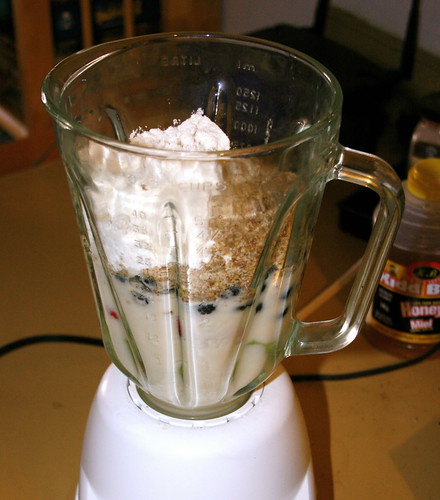by on JUNE 2, 2011
If there’s anything that greatly concerns me, it’s ladies who are pregnant drinking smoothies fortified with protein powder and munching on other high protein/low carb “health foods” in their quest to reach the magical number of protein grams per day recommended by their obstetrician or midwife.
When I was pregnant with my third child, I was horrified at one prenatal visit to find a basket of soy protein bars in the waiting room! This was at a birth center staffed by midwives no less!
While adequate protein intake is indeed important during pregnancy, getting this macronutrient via highly processed protein powders and high protein foods is a disastrous choice. This is because these same ladies that are drinking high protein smoothies and protein bars are very likely avoiding saturated fat at the same time. A diet high in protein and low in fat rapidly depletes Vitamin A stores.
Whole foods containing large amounts of protein naturally include protective amounts of fat such as eggs, grassfed beef and other meats. On the other hand, high protein processed foods are devoid of any fat in most cases making them particularly dangerous.
Depletion of Vitamin A stores during pregnancy is a dangerous problem as Vitamin A is critical to preventing birth defects such as cleft palate, cleft lip, major heart malformations, and hydrocephalus. Vitamin A is also the “beauty vitamin” responsible for symmetry in physical and facial features.
Vitamin A deficiency from consumption of high protein foods is not assisted by prenatal vitamins either as these worthless pills do not contain true vitamin A but instead the synthetic version, Vitamin A Palmitate or the plant based version beta carotene – little of which is converted to true Vitamin A.
Vitamin A depletion when consuming high protein processed foods is also risky for the average individual as well. Symptoms of Vitamin A depletion include:
- Heart arrhythmias
- Kidney problems
- Autoimmune disease
- Thyroid disorders
Negative calcium balance is also a risk with high protein, lowfat diets which means that more calcium is lost than what is taken in. Consequences of negative calcium balance include bone loss and nervous system disorders.
Know anyone who drinks a high protein smoothie everyday for lunch who develops a bizarre neurological disorder out of the blue? I personally know several.
I’ve wondered about the stories in the news recently of young, healthy, vibrant male athletes, some only in high school, who inexplicably drop dead during competition. Could these young men be eating lots of protein, much of it processed, while on a lowfat diet in order to build muscle and strength as recommended by bodybuilding magazines? Such misguided advice would rapidly deplete Vitamin A stores which could potentially lead to heart arrhythmia and sudden death.
Other Problems with High Protein Processed Foods
Besides depletion of Vitamin A stores, high protein processed foods contain potentially large amounts of MSG in the form of protein isolates. Separating protein from its food source during manufacturing results in the creation of MSG – the amino acid glutamic acid gone bad. Therefore, MSG is present in high protein processed foods but it is not on the label because it is not technically added to the final product. It is only created during manufacturing and therefore can be conveniently unlisted on the label.
Don’t buy into the “low temperature dried” protein powder fallacy as well. While low temperature processing and drying of protein powders is a less damaging manufacturing method, it still denatures the protein. Whey protein in particular is very fragile and cannot be dried or powdered.
A good rule of thumb is that no protein powder is a safe protein powder!
Good Alternatives to Protein Powder
Need a protein boost in smoothies and want to avoid the protein powders now that you realize the dangers to your health in using them? Try gelatin instead – it has 7 grams of protein per tablespoon. Gelatin is a colloidal substance which means it attracts digestive juices to itself similar to raw foods full of enzymes. Hence, gelatin is helpful to the digestion and contains a protein kick to boot.
Another option would be to add nutritional yeast (Frontier is the best brand as it has no additives and is low temperature dried) which has 8 grams of protein per serving.
Be aware that even natural gelatin contains small amounts of MSG, so if you are particularly sensitive, you may wish to choose nutritional yeast as the better alternative.
Sarah, TheHealthyHomeEconomist.com

No comments:
Post a Comment